Today Current Affairs: 30th May 2022 for UPSC IAS exams, State PSC exams, SSC CGL, State SSC, RRB, Railways, Banking Exam & IBPS, etc
Table of Contents
Russia’s Tsirkon Hypersonic Cruise Missile:
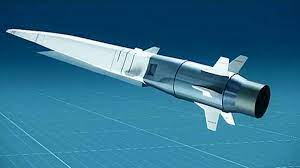
Russian frigate Admiral Gorshkov successfully test-fired a Tsirkon hypersonic cruise missile from the Barents Sea, Russia’s Defense Ministry said.
- The missile hit a naval target about 1,000 kms away in the White Sea and the flight of the projectile corresponded to the designed parameters.
- The Tsirkon missile has been test-fired several times from the Admiral Gorshkov frigate and a nuclear-powered submarine.
- The Tsirkon missile is capable of flying at Mach 9 or nine times the speed of sound and striking a target over 1,000 kms away.
Urban Sustainability Assessment Framework:

Posing a challenge for urban planners, UN-Habitat has identified multi-hazard vulnerabilities, urban sprawl, weak urban mobility and “green-blue disconnect” as the pressing issues for Jaipur city.
- The global body has based its findings on a sustainable cities integrated approach pilot project, as part of which the “sustainable urban planning and management” component was implemented in collaboration with the Jaipur Development Authority and Jaipur Greater Municipal Corporation.
- Jaipur has received an overall sustainability rating of three on the Urban Sustainability Assessment Framework (USAF) on the basis of data collected for 87 of its 131 parameters.
- Experts have identified urban sectors where the city needs to pay maximum attention, and made recommendations to increase its green cover, strengthen urban biodiversity, and enhance the quality of life for citizens.
- The project has received funding from the Global Environment Facility (GEF-6) to estimate the carbon sequestration potential of Indian cities.
- Mitigating urban sprawl remains a major challenge in the State capital, with the UN body emphasising the concept of a compact city with re-development and re-densification of the existing urban areas.
- As an indirect measure to curb development on the city’s outskirts, linking the distance from the main city to the development charges imposed on citizens could be considered.
Prime Minister’s Special Scholarship Scheme:

The Union government has extended a scholarship scheme from the United Progressive Alliance era for students from Jammu and Kashmir and Ladakh for another five years in the wake of the encouraging response it has received.
- The Prime Minister’s Special Scholarship Scheme (PMSSS) was introduced by the Congress-led UPA government in 2011 to provide funding to 5,000 meritorious students each year to study in private and government educational institutions across the country.
- Aimed at promoting employment opportunities for students from J&K and Ladakh, the scheme, with an annual budget of ₹180 crore to ₹190 crore, is implemented by the All India Council for Technical Education (AICTE).
- The term of the scheme was due to end last year, but the Central government decided to extend it for another five years for the benefit of students.
- The scheme offers 4,500 seats for general education courses (Bachelor’s in Arts, Commerce and Science), and 250 each for engineering and medical degrees.
- While the scholarship offered for general education courses is ₹1.3 lakh, including a ₹1 lakh maintenance fee to cover hostel and mess charges, it is ₹2.25 lakh for engineering and ₹4 lakh for medical degrees.
National Outreach Meet : Atal New India Challenge
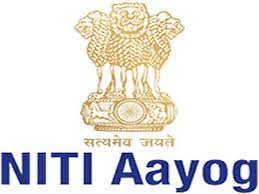
Atal Innovation Mission, NITI Aayog organised ‘National Outreach Meet’ for the second edition of the Atal New India Challenge (ANIC) at International Centre Goa, hosted by AIC-GIM Foundation.
- ANIC is a flagship program of Atal Innovation Mission, NITI Aayog.
- The program aims to seek, select, support and nurture technology-based innovations that solve sectoral challenges of national importance and societal relevance.
- Each ANIC winner will be eligible for a funding of up to INR 1 crore.
- The sectors in which ANIC 2.0 launched the challenges include E-mobility, Road Transportation, Space Technology and Application, Sanitation, Medical Devices and Equipment, Waste Management and Agriculture.
- The first edition of the ANIC program received more than 1000 applications for 24 challenges and is currently supporting 30+ startups through grants, partnerships, networking, tech support, mentorship, infrastructure and access to investors.
India’s First Biotech Park At Ghatti:
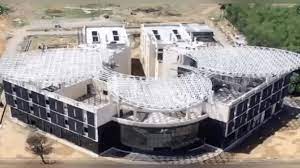
Union Minister, Dr. Jitendra Singh inaugurated North India’s First Biotech Park at Ghatti, Kathua district, J&K.
- This biotech park will carry out research on biodiversity, medicinal and aromatic plants of Jammu and Kashmir and Ladakh, and it will also promote green category businesses.
- The biotechnology park at Kathua has a potential to produce 25 startups in a year which will be among its great contributions to this region.
- The work on the two Industrial Biotech Parks, one at Ghatti, Kathua, Jammu and other in Handwara, Kashmir jointly funded by department of Biotechnology, Govt. of India, Ministry of Science & Technology and Jammu & Kashmir Science, Technology & Innovation Council was started in February 2019.
- CSIR-Indian Institute of Integrative Medicine, (CSIR-IIIM) Jammu has been entrusted with the responsibility of implementation of this project.
Draft National Data Governance Framework Policy:

The Ministry of Electronics and Information Technology (MeitY) recently released the revised Draft National Data Governance Framework Policy (NDGFP) and invited inputs on it before June 11th, 2022.
- NDGFP replaces Draft India Data Accessibility and Use Policy, 2022.
- The Draft National Data Governance Framework Policy (NDGFP) aims to enhance access, quality, and use of data, in accordance with the emerging technology needs.
- According to the ministry, this policy ensures the security of data and informational privacy. NDGFP standards and rules will cover all data collected and managed by any government entity.
- In February 2022, ‘Draft India Data Accessibility and Use Policy, 2022’ was opened for public consultation but it was strongly criticized by many.
- It proposed to allow the licensing and sale of public data by the government to the private sector.
- An ‘India Data Management Office (IDMO)’ is proposed which will be responsible for framing, managing and periodically reviewing the Policy and also developing guidelines under this Policy.
- IDMO will be set up under the Digital India Corporation (DIC) under the Ministry of Electronics and Information Technology.
- The IDMO will also prescribe data anonymization standards for both government and private entities that deal with data. This is to ensure that informational privacy is well maintained.
- IDMO is allowed to charge user fees for its maintenance/ service.
Restrictions On Sugar Exports:

The central government has imposed restrictions on sugar exports from June 1st, 2022 to increase the availability of sugar in the country during sugar season 2021-22 (October-September) and also curb price rise.
- Usually, during the festival season of October – November, the demand for sugar increases, and therefore, the government is committed to ensuring its adequate availability.
- According to the notification issued by the Directorate General of Foreign Trade (DGFT), the export of sugar (raw, refined, and white sugar) is placed under the restricted category from June 1st, 2022.
- However, these restrictions do not apply to sugar exported to the European Union (EU) and the USA under CXL and Tariff Rate Quota (TRQ).
- The priority of the government is to ensure sufficient availability of sugar for consumption at a reasonable rate in the domestic market, and divert more sugar into ethanol production.
- However, farmers are concerned with the export controls, as they will get less payment from traders, citing export control as an excuse.
- Some farmer groups say that sugar production is a surplus in the country and monsoon reports were also normal.
- So they believe government should have considered these factors before imposing restrictions.
- Wholesale prices of sugar in India are in the range of ₹3,150-₹3,500 per quintal.
- Globally there is a shortage of sugar mainly due to lower production in Brazil, which is one of the top producers of sugar.
WEF Travel And Tourism Development Index:

This index is the Travel and Tourism Competitiveness Index’s direct evolution, having been published biennially for the last 15 years.
- In the 2021 index, India has been ranked at 54th place in the latest edition.
- In 2019, India had ranked at 46th position.
- India topped within the South Asia region.
- The top place has been grabbed by Japan.
- The country is followed by the United States, Spain, France, and Germany respectively.
Collective Security Treaty Organisation:

The Collective Security Treaty Organization (CSTO) has marked its 30th year, at anniversary summit hosted by Moscow recently.
- Collective Security Treaty Organization is an intergovernmental military alliance (six countries) that came into effect in 2002.
- Its origin can be traced to the Collective Security Treaty, 1992 (Tashkent Treaty).
- The headquarters is located in the Russian capital of Moscow.
- The objectives of the CSTO is to strengthen peace, international and regional security including cybersecurity and stability, the protection on a collective basis of the independence, territorial integrity and sovereignty of the member states.
- Current CSTO members are Armenia, Belarus, Kazakhstan, Kyrgyzstan, the Russian Federation and Tajikistan.
- CSTO membership means that member states are barred from joining other military alliances, limiting, for example, their relationship with NATO.
- Most importantly, membership presumes certain key security assurances – the most significant of which is deterring military aggression by third countries.
- In the CSTO, aggression against one signatory is perceived as aggression against all.
- It however remains unclear whether this feature works in practice.
Surrogacy (Regulation) Act, 2021:
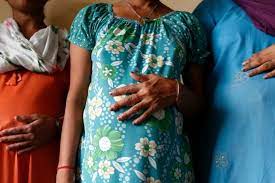
A petition was filed before Delhi High Court, challenging the exclusion of a single man and a woman having a child from surrogacy and demanded the decriminalization of commercial surrogacy.
- The petitioners have challenged their exclusion from availing surrogacy under the Assisted Reproductive Technology (Regulation) Act, 2021 and Surrogacy (Regulation) Act, 2021.
- The Petitioner argued that the personal decision of a single person about the birth of a baby through surrogacy, i.e., the right of reproductive autonomy is a facet of the right to privacy guaranteed under Article 21 of the Constitution.
- Thus, the right of privacy of every citizen or person to be free from unwarranted governmental intrusion into matters fundamentally affecting a decision to bear or beget a child through surrogacy cannot be taken away.
Surrogacy (Regulation) Act, 2021:
Provisions:
- Under the Surrogacy (Regulation) Act, 2021, a woman who is a widow or a divorcee between the age of 35 to 45 years or a couple, defined as a legally married woman and man, can avail of surrogacy if they have a medical condition necessitating this option.
- It also bans commercial surrogacy, which is punishable with a jail term of 10 years and a fine of up to Rs 10 lakhs.
- The law allows only altruistic surrogacy where no money exchanges hands and where a surrogate mother is genetically related to those seeking a child.
2020 Report On Medical Certification Of Cause Of Death:

According to the 2020 report on Medical Certification of Cause of Death (MCCD), the first year of Covid-19 lockdown saw the highest incidences of persons dying of respiratory illnesses in a decade.
Key Highlights of the MCCD Report:
- Total No. of Deaths: The total number of deaths, from all causes, in 2020 was 81.2 lakh.
- The report pegged India’s excess mortality for 2020 and 2021 at 47.4 lakh.
- Civil Registration System (CRS) data reported 4.75 lakh excess deaths from all causes in 2020 over 2019.
- Medically Certified Deaths: Medically Certified Deaths account for 22.5% of total registered deaths at national level but after taking into consideration any kind of medical attention received by the deceased at the time of terminal illness, it increased to 54.6%.
- Around 5.7% of total medically certified deaths have been reported in infants.
- Leading Cause-Groups of Deaths: Nine leading cause-groups of deaths constituting around 88.7%of total medically certified cause of deaths:
- Diseases of the Circulatory System (32.1%)
- Diseases of the Respiratory System (10%)
- Codes for Special Purposes – Covid-19 (8.9%)
- Certain Infectious and Parasitic Diseases (mainly consisting of septicemia and tuberculosis) (7.1%)
- Endocrine, Nutritional and Metabolic Diseases (5.8%)
- Injury, Poisoning and Certain other Consequences of External Causes (5.6%)
- Neoplasms (4.7%)
- Certain Conditions Originating in the Perinatal Period (4.1%)
- Symptoms Signs & Abnormal Clinical Findings “Not Elsewhere Classified” (10.6%)
Community Forest Resource (CFR) Rights:

The Chhattisgarh government has become only the second state in the country to recognise Community Forest Resource (CFR) rights of a village inside a national park.
- The CFR rights of tribals living in Gudiyapadar, a hamlet inside the Kanger Ghati National Park in Bastar district, were recognised, giving the community power to formulate rules for forest use.
- Kanger Ghati National Park is the second national park, after Simlipal in Odisha, where CFR rights have been recognised.
- The community forest resource area is the common forest land that has been traditionally protected and conserved for sustainable use by a particular community.
- The community uses it to access resources available within the traditional and customary boundary of the village; and for seasonal use of landscape in case of pastoralist communities.
- The Community Forest Resource rights under Section 3(1)(i) of the Scheduled Tribes and Other Traditional Forest Dwellers (Recognition of Forest Rights) Act (commonly referred to as the Forest Rights Act or the FRA) provide for recognition of the right to “protect, regenerate or conserve or manage” the community forest resource.
New Species Of Old World Monkey : Sela macaque
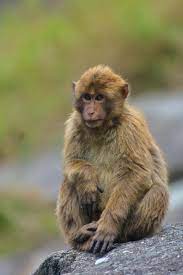
A new species of old world monkey recorded from Arunachal Pradesh has been named after a strategic mountain pass at 13,700 ft above sea level.
- Sela macaque (Macaca selai), the new-to-science primate was identified and analysed by a team of experts from the Zoological Survey of India (ZSI) and the University of Calcutta.
- Their study has been published in the latest edition of Molecular Phylogenetics and Evolution. Phylogenetics relate to the evolutionary development and diversification of a species or group of organisms.
- The phylogenetic analysis revealed that the Sela macaque was geographically separated from the Arunachal macaque (Macaca munzala) of Tawang district by Sela.
- This mountain pass acted as a barrier by restricting the migration of individuals of these two species for approximately two million years, the study said.
- Sela is situated between Dirang and Tawang towns in western Arunachal Pradesh.
- The study says the Sela macaque has a tail longer than the Tibetan macaque, Assamese macaque, Arunachal macaque and the white-cheeked macaque but shorter than the bonnet macaque and toque macaque.
- Sela macaque belongs to the sinica species-group of Macaca, but it differs from all other members of thisgroup through attributes such as brown collar hair and muzzle, and the absence of chin whiskers, the study says.
Bharat Drone Mahotsav 2022:
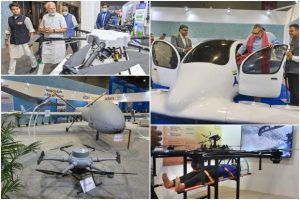
Prime Minister Narendra Modi inaugurated India’s biggest Drone Festival – Bharat Drone Mahotsav 2022. The Prime Minister also gave away 150 drone pilot certificates.
- Several industry leaders, government officials, foreign diplomats, representatives from Public Sector Units, private companies and drone start-ups are participating in the Mahotsav.
- They will deliberate upon India’s Civil Aviation sector.
- PM Modi highlighted the importance of drone technology in the fields of defence, disaster management, agriculture, tourism, film and entertainment. He said that the use of this technology is bound to increase in the coming days.
- Appreciating the use of drones in PM-SVAMITVA scheme, he said, 65 lakh property cards have been generated with the help of drones.
- Drone industry in India is estimated to achieve 15 thousand crore rupees turnover by the year 2026.
- He also narrated the use of drones in his official decision making through examples of PRAGATI reviews and Kedarnath projects.




